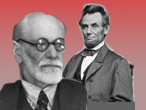PsychePolitics
PsychePolitics applies psychology to politics. It goes far beyond the usual image creation of traditional political psychology. Rather, it traces our path from birth, through family, into the unconscious, and then out into the world–the political world. PsychePolitics explains what politicians think and do that comes from their unconscious pasts, usually misapplied to the adult world of real problems, in particular political problems to be solved in an endurable way.
The goal of PsychePolitics is to broaden and deepen the political discussion by adding the perspective of political psychoanalysis. As readers of this Internet Newspaper/Blog compose their own psychepolitical contributions, we will all learn more. More and more, our political decisions will be adult and rational. As the general population learns how to “hear with the third ear”, as psychiatrist do, they will be less and less influenced by politicians’ notions of what is best. Ultimately, people will be able to elect leaders who will truly benefit society, rather than those with impractical, personal, utopian ideologies of what is best.
This newspaper posts articles to which viewers can make comments. More interested viewers may send more elaborate Letters to the Editor to offer their opinions of the subject of a given article/post. Finally, very interested readers may publish Op-Ed/Posts of their own, to which others may respond with comments or letters to the editor. Eventually, there will be a body of knowledge allowing for more refinement of PsychePolitics.
Dr. Melvyn Lurie
Melvyn Lurie grew up in Baltimore, Maryland and was educated in its public schools. He attended John Hopkins University, where he captained its soccer and tennis teams. He graduated with honors, winning the Pre-Medical Student Of TheYear Award and was elected to Phi Beta Kappa. At 20 he began his medical education at Harvard Medical School. It was interrupted for a year, when he was a research fellow at the Pasteur Institute in Paris, studying cellular immunology, graduating with honors and winning the Reznick prize for his Pasteur research.
Lurie interned in surgery at the Peter Bent Brigham Hospital (now Brigham and Woman’s Hospital) in Boston, then entered the U.S. Public Health Service at the National Institutes of Health in Bethesda, Maryland to continue his work in immunology.
In 1971 he moved to Emergency Medicine, when the field was in its infancy. After five years of seeing patients only briefly and desiring a specialty based on in depth knowledge of one biological system, he entered psychiatry at Harvard’s McLean Hospital. He remained on the Harvard Medical Faculty for the next 20 years, teaching students and postgraduate trainees.
At the same time Lurie established a multi-disciplinary private practice in Boston’s financial district, treating members of the business and legal professions. This led to organizational consulting and speaking to local businesses and government. He also served as an expert witness in a variety of legal cases and a consultant to the insurance industry and government in disability evaluations. To enhance his knowledge of the business world, at 58 he obtained an MBA degree in the evenings from Boston University’s Graduate School of Management.
As the healthcare system evolved, he switched to a focus on acutely ill psychiatric patients in hospitals. Currently he continues work with the seriously ill but now with the severely chronically ill. His teaching has not ceased. He combines the case and didactic methods in his work with Tufts medical students.
Lurie’s interest in Politics began early in life. It expanded to the international level during his fellowship years in paris. It was during that year that he traveled extensively in Europe, crossing the border at Checkpoint Charlie to see the soviet block first hand. He saw the long lines of food and the depressed lines of people. He was moved by the Berlin Wall Museum’s stories of courage and ingenuity of people escaping from the exploitative communist system.
Lurie settled in Boston suburbs to raise a family, but the lure of politics remained. He was active in the presidential primary of 1980, supporting the candidate with the most rational approach to the Watergate tragedy. He ran for local political office, served on his town’s Elderly Housing Committee, and spoke, often in poetry, at legislative town meetings. It was during these years that psychiatrist Lurie saw the deeper, unconscious psychological aspects of politics that led to this book.

 Can you immagine how the political ideas and aspirations envisioned by Abraham Lincoln and the exploration of the psychological mind explored by Sigmund Freud can be seen as one entity?
Can you immagine how the political ideas and aspirations envisioned by Abraham Lincoln and the exploration of the psychological mind explored by Sigmund Freud can be seen as one entity?